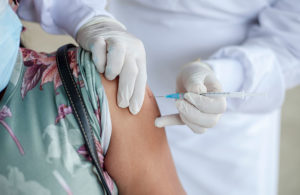
Photo by Frank Meriño from Pexels
FDA advisors are slated to meet to discuss the prospect of updating the first generation of COVID-19 vaccines for use as boosters this fall and winter.
But it remains unclear whether updating the COVID-19 vaccines will be necessary. Both Pfizer (NYSE:PFE) and Moderna (Nasdaq:MRNA) have updated vaccines in the works.
Pfizer and Moderna have both said their next-generation vaccines appear to be more effective against the omicron BA.1 variant. But fighting the growing number of omicron lineages could prove challenging. For example, the recent emergence of BA.4 and BA.5 subvariants threatens those infected with older omicron variants.
Pfizer noted in a press release that it was developing monovalent and bivalent versions of its COVID-19 vaccine, developed jointly with BioNTech. Protection appeared to be substantially stronger against the BA.1 subvariant than the BA.4/BA.5 subvariants. Still, the companies plan on gathering additional data on vaccine performance relative to the BA.4/BA.5 variants in the coming weeks.
GSK plc (LSE/NYSE:GSK) and Sanofi (NYSE:GSK) have also announced that their adjuvanted bivalent vaccine candidate was efficacious against omicron in adults in stage 2 of a Phase 3 study. That vaccine candidate is based on the original D614 virus and the beta (B.1.351) strain.
BA.4 and BA.5 currently are responsible for more than one-third of COVID-19 infections in the U.S.
Other variants are likely to emerge between now and the fall.
But current COVID-19 vaccines are less effective at generating neutralizing antibodies against BA.4 and BA.5 than the first version of omicron.
Assuming SARS-CoV-2 doesn’t evolve significantly between now and fall, updated vaccine versions are “more likely to be helpful” than readministering the existing vaccines, Dr. William Hanage of the Harvard T.H. Chan School of Public Health told ABC News.